by Jenny Rose | Mar 25, 2023 | A Flourishing Woman, The Journey
We moved into this house a little less than a year ago.

New Home, May 2022
The chaos of the transition gradually ebbed away, leaving me beached with all my things and a sometimes fearful, sometimes eager curiosity about what this new chapter of my life would bring. This move, for me, was not random, but intentional. I felt it as an important step in my journey to an unknown destination. At this point in my life I’m not much interested in destination; my fascinated gaze rests on my inner and outer landscapes as the days come and go. I travel in the direction of freedom, space, and simplicity.
These last months I have spent time sitting in various places in my space dreaming, imagining, listening to the whispers of this old house, audibly exploring the surge of the neighborhood outside my windows and walls. I have watched the garden leaf out and bloom, then wither and die. I’ve learned the slant of the sunlight coming through the tall windows. From the chaise where I sit writing this morning I can see a patch of eastern sky through the bare branches of a neighbor’s tree outside the kitchen window; from here I watch the dawn come during my early morning journal time.
We have updated the electrical system. We have updated the plumbing. We have invested in a hybrid hot water heater, shaving our electrical costs. We have bought and installed a sump pump in our wet cellar. I have brought home innumerable paint chip samples, pinned them to walls and woodwork in every room, watching them glow and dim as hours and seasons pass across them.
I have refrained from adding anything to my space, filling it instead with a mist of dreams and imagination. Indeed, I subtract objects as I clean and scrub and mop the scarred, stained, pine floor. I’ve lived with the gouged trim, the slapdash paint, decades of nails, rusting staples, and screws in the plaster walls which, when pulled, leave large, crumbling holes.
When I first saw the house, in pictures on a real estate site online, my bedroom was being used as a dining room. It remained a dining room the first time we were here, New Year’s Eve 2021. Our attention was drawn to the exposed original tin ceiling in the living room next to it; we were told the same ceiling was above a newer suspended ceiling in the adjoining kitchen.
In the then-dining room, now my bedroom, another suspended ceiling was installed, the kind with a metal grid supporting ceiling panels seen in office spaces. Some of the panels were painted in lavender curlicues.
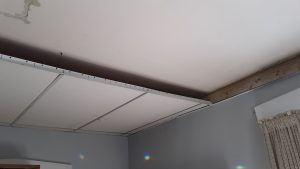
Bedroom ceiling 03/23
It was laughably hideous. I laid in bed and looked up at the ceiling, wondering what was above the curlicues. Another tin ceiling? Plaster? The naked underside of the floor above? One day I would find out.
That day was a couple of weeks ago. One morning my partner and I took the tall steps into my room and pushed up one of the panels, revealing an old plaster ceiling that had been wallpapered and then painted. We could see ancient water staining and cracks.
Once I knew, I couldn’t wait to get the suspended ceiling down. I gathered tools and ragged sheets to throw over my furniture and went to work.
Some of these old houses have plaster made with asbestos. Wallpaper and glue contained arsenic to discourage rats. Older paint often contained lead. As I worked, I uncovered at least two layers of wallpaper and three of paint. I opened a window for ventilation and, wincing, pulled nails and screws out of the plaster, which created the most damage. I used a putty knife to peel up the curling loose edges of wallpaper and flaked paint, leaving what is firmly adhered in place. I worked for a couple of hours, absolutely happy. It took another hour to clean up the mess and get the debris into the dumpster.
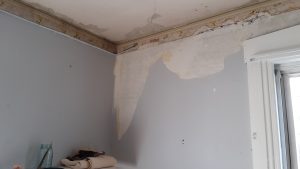
Bedroom 03/23
I’ve taken out two thirds of the suspended ceiling now. The room remembers its former elegant lines. In some places the plaster walls are stripped naked. As I lie in bed, I wonder what this room has contained. How have others who lived here used this space? Who chose the first layer of wallpaper, and the second? Whose hands glued, papered, painted? Who put in this screw and that nail, and why?
Some might find the room austere, bleak. I don’t have much in it right now, because it’s just more to cover, move, and clean as I go. I have a single bed, small but as luxurious as I can make it. The high ceiling soars above the ragged walls like a cloudy autumn sky soars above tattered trees.
All my life something in me has rejoiced in bareness, in spareness. The space between and around objects means more to me than objects themselves. Color, light, air, and music, ever-changing, pure, without form, sustain me more than things.
In this bedroom, in this house, I’m conscious for the first time in my life of a longing for expansion, not to contain more things, but to contain more life, more being. I’m awed by my own freedom, my release from so many burdens I carried in earlier years.
Peeling away flaking wallpaper, brushing away crumbling plaster, I feel like a sculptor. Gentle-handed, I pry and pull. I’ll fill holes, patch, spread joint compound. It will take time. It will make messes. Plaster dust will float out my open windows. One day walls and ceiling will be ready for new coverings of color and texture. I’ll throw sheets over piled furniture, work, clean, move it all back, one wall at a time. I’ll replace the two tall, elegant windows. I’ll glue up faux tin ceiling tiles, honoring the house’s colonial period and aesthetic. The days and hours will pass. Light will move across the walls and ceiling. I’ll open the curtains in the morning and close them at night. I’ll eat and sleep, work and write, swim and walk while the seasons turn around me.
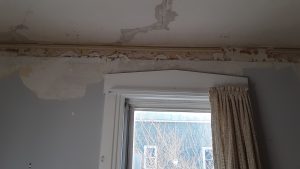
Bedroom 03/23
As I stroke the house, uncovering, reducing, baring, and finally reclothing its lines, my own skin loosens, cell by cell. My eyebrows and lashes diminish. My skin thins and dries, stained by sunshine, silver-rippled by the full moon of long-ago pregnancy. My flesh softens.
Neither the house nor I will again be firm-fleshed, new, perfect. Repaired plaster has a variable, subtle landscape. I have lived in my body for nearly 60 years. Life shapes us and makes us its own. Many lives have had their being within these walls, but I am comfortable with their ghosts.
I think of my own ghosts, too, as I work. Life and time have molded the house and me. The ghosts we call memories stay within us, haunting or blessing, as the case may be. As I chip away at painted-over screws and staples, remove panels and pull away pieces of metal grid, I release the house from the past as I release my own excrescences, recognize and mitigate my own toxic layers of what others expected and how they defined me.
I did not know how captive I was until I found myself free.
Questions:
- What has held you captive in your life?
- Do you find more joy in stripping down (subtracting) or layering on (adding)?
- Are you more likely to repair flaws or cover them cosmetically?
- Are you distressed by “imperfections” in your environment and/or your body and cover or hide them, or do you honor them?
Leave a comment below!
To read my fiction, serially published free every week, go here: 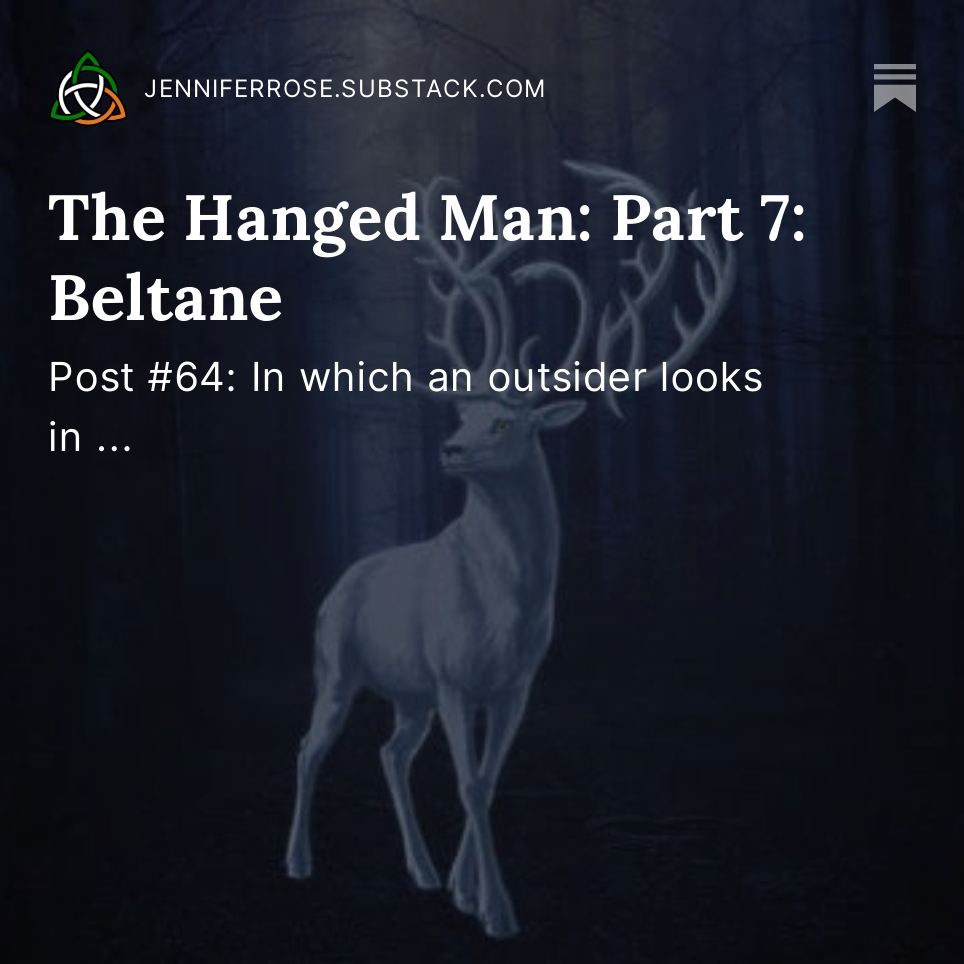
by Jenny Rose | Nov 6, 2022 | Boundaries, Connection & Community, Emotional Intelligence
I’m sitting at my desk this morning, the sun shining on the wet grass scattered with wrinkled leaves outside my window. I’ve just been running errands. My desk, unusually, is piled high with scraps of paper, notebooks, my calendar, receipts, to-do lists, and a new binder and paper I just bought to help me organize. My big grey tabby, Oz, is busily knocking everything off the desk and chewing on a new plastic package of AAA batteries because I won’t let him lie on the keyboard.

Photo by Joanna Kosinska on Unsplash
I was sick most of October. I’m finally on antibiotics; I can breathe, and consequently think, more clearly. A week ago an aged family member living halfway across the country with whom I have a lifelong troubled history became openly unable to manage their life and then fell and broke their hip in quick succession.
Sometimes life requires us to muster every bit of learning, wisdom, strength, courage, insight and experience we have in a catastrophic practical test, like a nightmarish pop quiz. This is one of those times. It helps to look at it that way, because I know I have (somewhere) everything I need to manage this situation with all my considerable compassion and clear-sightedness.
This last week I let go of everything. My living space needs to be cleaned. I desperately want to change my sheets after so many nights crying, coughing, and trying to breathe adequately enough to snatch some sleep. I’m longing to escape my phone and laptop, sit in the sun, read, relax, do some gentle gardening (still like late summer here in Maine). I haven’t even started on this post yet, a thing I usually do during the week.
I made it to work. I made it to the doctor for antibiotics. I stayed hydrated. Aside from reactive crisis intervention and coming to terms with what’s happening long-distance, that’s about all I can say for myself. But now, at last, I’m beginning to stir feebly into some kind of normal experience again.
It’s a relief.
I opened this document and started typing without any plan whatsoever. I don’t have to post today on this blog. It wouldn’t matter if I didn’t. I suppose I’ve grown used to the opportunity to organize my life into words every week.

For nearly a decade I’ve worked intensively on boundaries. Ten years ago I knew nothing about personal boundaries. My life was accordingly dysfunctional. It was hardly my life at all, in fact. It was everyone else’s life. I’ve written extensively about boundaries on the blog, and the concept of the difference between your experience and mine is woven heavily into my fiction. I’ve practiced building and maintaining healthy boundaries in the last years, though I’m still far from perfect in working with them.
But I’m getting better all the time.
When we are prevented from building appropriate psychological boundaries as children, we never create an internal world in which we can rest, center, and ground. We become an image in someone else’s mirror, a paper doll, a nonperson.
Nonpeople have no needs, no credibility, and no permission to express themselves as individuals. It’s worse than no permission, though. Nonpeople are severely punished for any independent feeling, need, or expression. Nonpeople have no private life. They’re not allowed to say no.
This kind of relationship, sadly, is often invisible to onlookers. From the outside, such connections look bonded and mutually adoring. The public view never sees the anguish involved in a relationship without boundaries.
Anguish on both sides. Those who seek to prevent others from having boundaries are deeply damaged, insecure people whose own boundaries were likely brutally violated and torn down. They are terrified of being alone, and a boundary makes them feel utterly outcast and rejected.

Photo by Nicole Mason on Unsplash
But for me, boundaries are sanity. They’re safety. They allow the power to choose and respect to flow both ways. They say, “My self is worthy. Your self is worthy. We can choose to love one another as well as ourselves.”
Reshaping a primary relationship with no boundaries into one with healthy ones is excruciating. It may not be possible. I haven’t decided it is impossible, but I wonder. One of the hardest things about it is how it looks to outsiders, who don’t understand why all the harsh edges and corners are suddenly showing in such a perfect, loving relationship, the kind we all want, the kind we should feel lucky to have.
Another feeling I’m present with just now is the nauseating swing between relief and guilt. All secrets, painful family secrets included, have an uncomfortable way of being revealed. Even if everyone involved conspires to keep the secret, eventually, often in a you-couldn’t-make-this-stuff-up kind of way, someone or something like a terrible series of events exposes it.
I’ve posted about such ideas as loyalty, responsibility, duty, gaslighting and projection. The bars of prisons built by family systems are forged out of concepts and strategies like these. But when a secret escapes the bars melt away and we’re suddenly free. We’re not alone in solitary anymore.
Some stranger says to us, “Oh, yes. I’m familiar with that dynamic. I’ve observed that behavior. I understand,” and we realize we are not crazy. We are not mean and ugly. We are not hateful.
We are not alone.
The relief of validation is indescribable. So is the guilt accompanying the relief. When we guard secrets, literally with our lives, for the sake of protecting the dignity of a loved one and the secrets are revealed through no fault of our own, we also feel exposed. The mere fact that we were the designated secret keeper means we failed.
Our love and the cost of bearing the secret’s burden for so long doesn’t matter. The least we can do, the least we can do, is remove all the boundaries we’ve erected so carefully and painstakingly and once again give up our lives, our freedom, our selves. Our loved one’s anguish should become our anguish, their pain our pain, their limitations our limitations. If necessary, their death should be our death. Because we betrayed, we let them down, we failed.
The secret got out.
I can’t see very far ahead. It’s not useful to gaze at the road behind. I’ve already walked it and everything is different now, the people involved and the situation. Right now I know where I am. I can see the next steps. This is a new path, one I’ve never taken before. It’s a new script, a new experience. I’m working on releasing my assumptions. I don’t know what will happen next. I can predict, but predictions make me tired. What I have is right now, today. I know what I will do today, both in my personal life and to manage my loved one’s situation.
This time I will find a way to inhabit my boundaries and support my loved one without sacrificing one for the other. I will make phone calls, send emails, get myself organized to do whatever I can long distance and prepare to travel in case of need. I will grieve.
I will also write, get outside, do some laundry, maybe take a nap, and work on recovering my health, because mine is the only life I can live.
To read my fiction, serially published free every week, go here:
by Jenny Rose | Jul 9, 2022 | Power
When we bought our new house, a flagpole and the American flag came with it.

Photo by David Beale on Unsplash
The day Roe v. Wade was overturned, we took down the flag. I don’t recognize America anymore. The democracy I grew up in is languishing and I no longer feel our government represents the best interests of people or planet. It certainly isn’t interested in surviving and thriving for any but a select few power-over people who are impotent, incompetent, and emotionally bankrupt, not to mention unbelievably stupid. These times are the logical end stages of capitalism. We are so far astray we have made money into a god and worshiping that god has us all on our knees and many of us face down in the street being murdered. I’m not celebrating. I’m grieving. I’m angry.
The pandemic years and increasing awareness and visibility of systemic racism brought the discussion of freedom into daily discourse. What freedom is. What freedom isn’t.
Freedom is power. People who work for power with others focus on supporting an equitable playing field for all. That means some people need to lose some power and others need to have theirs restored so we all have equal access to resource.
Power, by the way, is not defined by money. We’ve been culturally brainwashed to believe it is, but it’s not. Who benefits from the persistent and relentless narrative insisting it is? Are you benefitting?
People who work for power-over are afraid. Fear breeds hatred. Other words for hatred are racism, homophobia, and bigotry. Power-over people, like any tyrant, fear rebellion, and all their energy goes into controlling information and brutally silencing dissent or discussion.
What we are allowing to take shape is a dystopian world. It’s not a movie we’re going to walk out of in two and a half hours. It’s not a science fiction book. It’s not a role-playing game.
It’s real, and it’s really happening. Just like climate change, it’s not something to scare or depress ourselves with and then, like Scarlett O’Hara, tell ourselves we’ll think about it tomorrow. Tomorrow was yesterday. Climate change and the end of democracy are not far-off footsteps in the night-dark and scary forest. They’re here. They’re now. They’re in our tent with us.
Here are characteristics of a dystopian society:
- Communication (misinformation) is used to control citizens.
- Information (facts), critical thinking, and freedom are restricted.
- Citizens worship a figurehead or ideology.
- Citizens perceive they are under constant surveillance.
- Citizens fear change, new information, or new experience. Anything or anyone different is perceived as a threat to existence. Conformity is paramount. Individuality and dissent are stamped out.
- Citizens are stripped of their humanity.
- The natural world is raped, poisoned, and distrusted.
- Controls force citizens to accept the illusion of a perfect utopian world.
Dystopian controls include corporate, bureaucratic, technological, and philosophical/religious entities.
Welcome to the dawn of dystopia, people. For most of us, freedom is slowly vanishing, but it’s still possible to reclaim it. There are people who see clearly and speak and write the truth. Some of us believe in the common good and in living in service to others, to justice, and to the planet. We can fight. We can refuse to be silenced. We can hold fast to one another and balance the growing hate in the world with our love and righteous anger.
I’ll leave you with a couple of thoughts from Toni Morrison:
“The function of freedom is to free somebody else.”
“Freedom is choosing your responsibility. It’s not having no responsibilities; it’s choosing the ones you want.”
Be well. Take care of yourselves and each other.

Photo by Sue Tucker on Unsplash
by Jenny Rose | Feb 19, 2022 | Connection & Community, Emotional Intelligence, Shadows
Now that I publish my fiction on Substack, I read regular content from the platform, and a few weeks ago the platform runners wrote an essay about censorship titled “Society has a trust problem. More censorship will only make it worse.”
I’ve read and reread that essay.
I’ve been trained as a librarian, and one of the most important tenets of professional librarians is freedom of information. One of the things that drove me out of my job as an elementary school librarian in a public school system was pressure to take Harry Potter off the shelves. I told the school board I wouldn’t do it. If they had to fire me, so be it, but I wouldn’t take the books off the shelves. I asked if any school board member had actually read one of the books in question. None had. Surprise, surprise.

Photo by John Salvino on Unsplash
Freedom of speech and freedom in general have been hot topics since the 2016 presidential election and COVID. I’ve written before about freedom of speech, which is not all-inclusive.
In the last six years, cultural censorship has increased enormously, but it’s failed to silence anti-vaxxers, proponents of the election Big Lie, COVID naysayers, and people who believe men cannot become women, or vice versa. It’s also failed to address increasing civil violence, disconnection, and unrest.
Does censorship work? Is it a useful tool?
It doesn’t appear so. I’m irresistibly reminded of the “Just Say No” drug campaign for school kids and sexual abstinence programs for teens. Do they work?
Not so much.
It seems to be a human character trait that the minute we’re forbidden to do something we move heaven and earth to do it. Look at Adam and Eve. Look at Pandora. Dozens of old oral stories from around the world are about people who broke their promise not to look and suffered the consequences.
I’ve never thought to ask myself what problem we’re trying to address with censorship.
Is it cultural trust?
Possibly. Trust is an easily manipulated quality, because it’s a belief. Belief, as we’ve seen demonstrated over and over during the last years, is more powerful than facts. People will die for their beliefs. They’ll kill for them.
Are beliefs strengthened or weakened by access to all kinds of information (facts) or opinions? Are beliefs strengthened or weakened by censorship?

Photo by Cristian Newman on Unsplash
I’m not sure trust is the root problem, though, or not the entire root. Perhaps the deepest root is education and, paradoxically, freedom. Authoritarianism is characterized by blind submission to authority. One of the tools of authoritarianism is censorship, including limiting the rights to vote, read, write, report the facts, speak, and teach.
Censorship implies people can’t be trusted with a full range of information. They are unable to make the “right” choices, according to the authoritarian(s) at the top. Thus, the public is spoon-fed only that which supports the authoritarian power. Asking questions is not allowed. Challenge is not allowed. Discussion and debate are not allowed.
Don’t you worry your little head about substance abuse. Just say no. We don’t talk about sex and our bodies in this house. It’s dirty and shameful. Just abstain from inhabiting your healthy young body.
The subject of censorship is tricky, because I suspect we’d all like to have the power to censor certain voices on social media, on radio, on television, in the bookstores, on YouTube, and on platforms like Substack. Some of the propaganda and opinions out there, the lies masquerading as facts, are horrifying. However, my lie might be your fact. Your heart-felt ideology about eating meat may be in direct conflict with what I need to sustain my health and quality of life. Should one of us have the power to censor the other?
This is where the trust problem comes in. We don’t trust one another to make the “right” choices or believe the “right” people. I think many don’t trust themselves to make the “right” choices. They rely on someone they have faith in to tell them what to do.
The “right” choices imply the possibility of “wrong” choices, but this is black-and-white, overly simplistic thinking. Perhaps you need to be a vegetarian in order to sustain your health. Perhaps I need to be a carnivore. We’re both right. Does that mean a full range of diet and nutrition information should be available to all? Can we, as a culture, agree to live and let live?
I have my doubts.
The current specific issue on Substack is the subject of COVID. Evidently, there are writers on the platform spreading dis- and/or misinformation about COVID. Scientists on Substack sending meticulously researched, linked, and data-driven information take issue with that and want Substack to censor such writers for the sake of the public good.
Substack, in response, wrote the above essay, maintaining their position against censorship and explaining their thoughts about it.
I’m in sympathy with both sides. I, too, am frustrated with the sheer volume of unmitigated bullshit out there. But I never forget many people would say my sources of information are bullshit, and I would fight hard to maintain access to those sources.
Maybe the problem is not how deep the bullshit is, but how bad we are at recognizing it. And that’s a product of our broken education system and our inability to think critically. Both these cultural trends make us increasingly vulnerable to authoritarianism.
As I’ve discussed before, choice goes hand-in-hand with responsibility. If we want optimum freedom to choose, we must accept the consequences of our choices.
Taking responsibility for our choices is not humanity’s greatest strength at this moment in history.
If I was Supreme Ruler of the World (God forbid), I believe I would vote with Substack on this issue of censorship. Silencing people does not address the root of the problem, only a symptom. We need to figure out a way to fix our educational system so we all learn critical thinking at every stage of education. Not only does this empower people to make their own choices and recognize the difference between lies and truth, opinions and information, it allows public access to a full range of viewpoints.
We are never going to silence the liars and manipulators. They will continue to try to obtain power and money, and they will continue to aggressively work to silence those who disagree with them. The best weapon against them is to firmly empower ourselves and others with education and the ability to think critically. We don’t need to be protected. We need to be armed.

Photo by Nicole Mason on Unsplash
by Jenny Rose | Nov 13, 2021 | A Flourishing Woman, Self-Love
I’ve been thinking about this post for a couple of weeks. It’s funny how a brief note to myself, frequently glanced at, suddenly grows into a vital, dynamic idea compelling me to weave a net of words and capture it.

Photo by freddie marriage on Unsplash
For most of my life I’ve been a compulsive list maker. I had lists of lists and carefully checked items off as I dealt with them. I thought of lists as tools to keep track of things and remember what I needed to do, and that may have been partly true, but an uglier aspect was how useful they were as weapons of self-hatred for not working hard enough, not being productive enough.
After I moved to Maine, I came across the idea of making reverse lists; that is, listing what I did accomplish rather than what I thought I should accomplish. This reduced my ability to schedule shame myself, but my nasty internal critic was never satisfied. No matter how much I’d done, he thought I should have, could have, done more. However, reverse listing allowed me to see more clearly that I actually accomplish quite a lot most days, and that helped me push back against the internal critic. He lost a little power.
Still, my sense of self-worth was entirely tied to production, to doing rather than being.
Over time, my reverse listing became more of a series of short, journal-like notes, part of my daily routine. Now and then I looked back at them to see what day I’d run an errand or made a phone call, but I never stopped to consider the real value of reverse listing.
A few weeks ago, I realized the purpose of reverse listing had become a way to hold myself accountable, to be sure I didn’t slack off or forget everything I have to do to justify my existence. I needed to keep an eye on myself because I’m so lazy and undisciplined. If I don’t watch myself all the time, I won’t do any work at all. The practice was a daily no-confidence vote for myself.
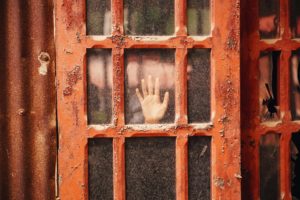
Photo by SHTTEFAN on Unsplash
This is so ridiculous I had to smile. I am many things, but lazy isn’t one of them. And if I do spend a lazy hour sitting in the sun with a good book, who cares? The world doesn’t stop.
I asked myself a daring question: What if I stopped making reverse list journal notes every day? What if I closed that notebook and put it away? What if I adopted an attitude of complete confidence in myself, my value, and my effectiveness, no proof required?
Hey, less clutter on my work table!
Immediately, I felt guilty and a little scared. If I didn’t write down tasks as I did them, where would the evidence justifying my existence be? How would I hold myself accountable, keep an eye on myself, make sure I’m being useful?
Honestly, sometimes the inside of my head appalls me. It’s good no one else is in there.
Along with all these thoughts and feelings was something else. A gleeful, childish feeling of getting away with something big, a sense of freedom.
Jailbreak.
So I closed the notebook and put it in a drawer. I got up the next morning, went through my morning routine, wrote, went to work, swam ¾ of a mile, came home. And the next day. And the next day. I did laundry and cleaned the bathroom. I cooked and fed myself. I swept cat litter off the floor and took the compost out. I paid bills, took walks, and ran errands.
I lived my usual life and not one single authority came knocking at the door demanding to see my reverse list in order to decide if I was allowed to go on taking up space.
Not even me.
Which brings me to the realization that finally brought this post into being.

Photo by John Salvino on Unsplash
I build myself all kinds of jails. Lists were just one. Trying to please others is a jail. Trying to meet expectations is a jail. Trying to understand others when they don’t communicate clearly and give mixed messages can be a jail. Trying itself can be a jail. Ironically, having poor boundaries is a terrible prison that shrinks a little more every day. Shame is solitary confinement. Taking on too much responsibility, arguing with what is, agonizing over things I have no power to change, trying to fix things for other people, are all prisons.
You know what? I’m really, really tired of living in jails of my own construction.
Fortunately, I have keys to all of them.
Now, I know I’ll be back in jail, at least temporarily, because it takes me a minute to realize it’s happening again. It’s such an old pattern.
But I’m not going to put sheets on a cot and live in a prison cell. It just makes everything worse. Whatever the challenges or problems I face, they’re much better dealt with from a place of freedom and power.
I’m a far from perfect woman, but I don’t deserve to be locked up for the rest of my life with the key thrown away.
No more jail. I’m outta there.














